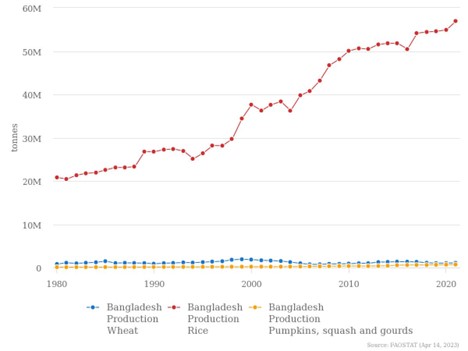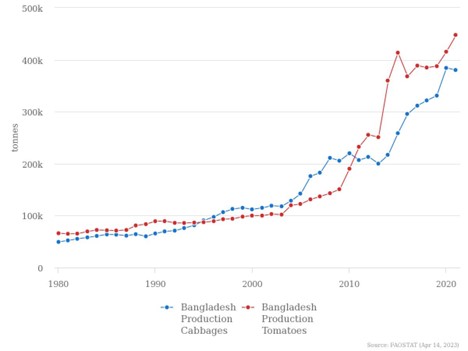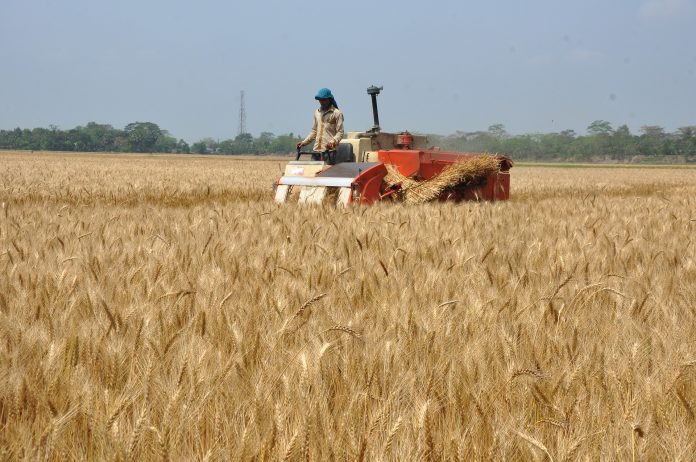PBS News Weekend ran a story claiming farmers in Bangladesh are developing innovative ways to adapt to climate change. That Bangladeshi’s are innovating is laudable and valuable, but their actions have nothing to do with climate change because data show no significant changes are affecting Bangladesh. In short, the innovations taking place are adaptations to weather patterns and events that have impacted Bangladesh from time immemorial.
The report, “Driven by necessity, Bangladesh develops innovations to fight climate change,” opens with this claim:
The low-lying nation of Bangladesh suffers disproportionately from climate change, despite producing just 0.5 percent of the world’s carbon emissions. It’s also creating innovative ways to predict and protect against climate-driven disasters, and discovering new ways to build resilience using natural resources.
Continuing:
Even in the most isolated parts of Bangladesh, communities have devised ways to stay ahead of potential weather disasters, like floods and cyclones. And they’re discovering new ways to use the natural resources around them to build resilience.
In its quest to promote the narrative that the world faces a climate crisis, PBS turned a story about how Bangladeshis are adapting the extreme weather into one more misguided climate alarm story. Even PBS acknowledges that Bangladesh has several strikes against it when it comes to extreme weather. Bangladesh consists almost entirely of a relatively flat coastal and riverine flood plain, beset by monsoons and cyclones annually.
First, what are the factors that make Bangladesh particularly vulnerable to climate change?
So it’s really the geography. I mean, Bangladesh is a low lying country, essentially, the whole country, or almost the whole country is a River Delta, just south of the Himalayan Mountains. I traveled in the north of the country, which is essentially like, think of capillaries kind of crisscrossing the country.
So these are tiny, muddy, narrow, shallow rivers in the dry season. But in the wet season, they just become like a shallow sea.
Weather conditions on the Indian subcontinent, where Bangladesh is located, have not changed. The monsoon cycle has not become more or less severe, as explored in Climate Realism here and here, for instance. Nor, as discussed here and here, have tropical cyclones become more frequent or intense.
As a result, Bangladesh’s people are not innovating and adapting out of necessity in response to a changing climate, but rather to diminish the negative impacts of weather patterns that have been common throughout the country’s history.
Extreme weather events that have historically been a fact of life in the region for as long as people have resided on the Indian sub-continent. Based on Bangladesh’s increased crop production over the last 40 years of climate change, one suspects Bangladeshi farmers began innovating, long before the terms “global warming” and “human caused climate change,” became part of the global media’s daily lexicon.
Bangladesh relies heavily on agriculture. Rice and wheat are its top two cereal crops. Squash and pumpkins are important crops as well and squash was specifically discussed in PBS’s story. According to the FAO, Bangladesh’s production of each of these crops has increased tremendously since 1980:
- Rice production has grown by more than 173 percent;
- Wheat production has increased by nearly 32 percent; and
- Squash/Pumpkin production has surged by more than 628 percent. (see the figure below)

The production of top vegetable crops in in Bangladesh, like tomatoes and cabbages, shows even more impressive growth, presumably due to improved technologies, agricultural methods, and innovation. (See the figure below)

Since the long-term weather patterns and conditions have not changed in Bangladesh, contrary to PBS’s claims, climate change has not forced Bangladeshis to innovate. Rather, they did so, as farmers in other countries around the globe have, in a quest for a better life for themselves and their children. In the end, PBS’s story about Bangladesh is an uplifting one concerning how innovation and adaptations can lead to agricultural success even the in face of challenging geographic and atmospheric conditions. Too bad PBS felt the need to try and force Bangladesh’s success story into the pre-fit mold of the climate crisis narrative.


















Blaming innovation and adaptation on climate change is a big change from blaming devastation and death on climate change.
Soon the Biden Administration will begin blaming rising energy prices, increasing energy shortages and reduced grid reliability on climate change.
Bravo Mr Burnett. Keep stiking to facts, that’is the most effective weapon remaining to realism. And congratulation for your book for students.